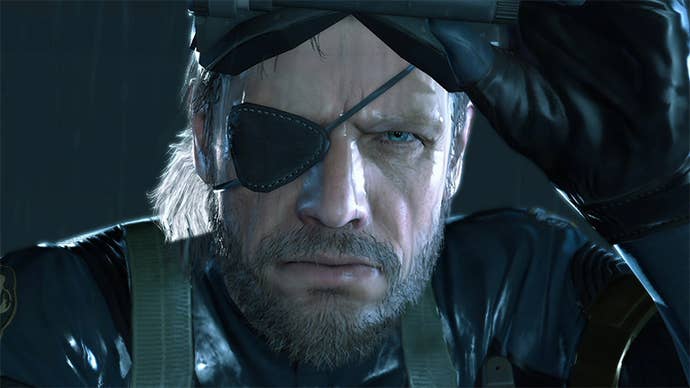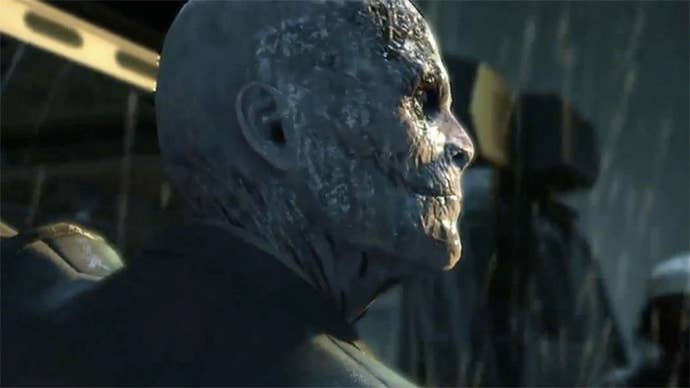E3 Precap: Whither Metal Gear?
Hideo Kojima's long-running series is loaded with more baggage than LAX. Will E3 change our minds about Snake's future?
This article first appeared on USgamer, a partner publication of VG247. Some content, such as this article, has been migrated to VG247 for posterity after USgamer's closure - but it has not been edited or further vetted by the VG247 team.
For one brief, shining, moment, Metal Gear defined the future of video games. While other developers of the PlayStation era clumsily struggled to lend convincing Hollywood flair to their productions, Konami's Hideo Kojima came out of nowhere and applied the powers of his idiosyncratic, movie-obsessed mind to a series most of us regarded as a relic of the 8-bit generation. The result was Metal Gear Solid: an extremely memorable action movie sendup that mixed equal parts confidence and silliness, and filled our heads with all the references that would later create the Internet's most overused memes.
Newly crowned the King of Video Games, Hideo Kojima could have went anywhere and done anything after the late-'90s success of Solid, but he stuck with a sequel that ended up being way too smart for the room. Say what you will about the game itself, but the way Metal Gear Solid 2's misleading marketing factored into its message was nothing short of brilliant — but those who craved another stylish Solid Snake adventure were left wanting. 2001 might seem like ages ago, but it marks the beginning of Metal Gear's continued struggle for relevancy after Hideo Kojima's turn at playing Andy Kaufman blew up in his face. Having worked at a game store during the release of MGS2, I can attest that Metal Gear fans were not happy with its creator's playful experimentation.

So, how does all of this back story relate to Metal Gear Solid V: The Phantom Pain? Like each of its predecessors, the production of this latest installment of the saga carries the burden of its own unique baggage. Metal Gear Solid 3: Snake Eater — which celebrates its tenth birthday this year — was a direct reaction to fans' hatred of Metal Gear Solid 2, and jumped backwards in time to distance itself from Raiden, the much-hated blond bishounen who served as Sons of Liberty's protagonist. Metal Gear Solid 4 seemed destined to be the PlayStation 3's savior during that console's darkest days, and while its sheer insanity was admirable, it portrayed a game developer unwilling to learn from past mistakes. Peace Walker — which honestly should have been called Metal Gear Solid V — ended up burdened by low expectations, and many overlooked its addictive mix of base management and Monster Hunter-ing thanks to the pathetic state of the PSP in 2010.
The Metal Gear name has been kept alive over the years via HD remakes and a slow drip of Phantom Pain media, and the massive floor space dedicated to MGS5 at last year's E3 indicates that Konami very much believes in the series' future — possibly because it's the only future the publisher has. I've been a fan of Metal Gear through its ups and downs, but stayed away from the recent Ground Zeroes because of its predatory pricing and relentlessly grim tone that supremely mishandled some extremely delicate subjects. While the undercooked localization gives us villains with names like "Skull Face," much of the silliness the series once reveled in seems to have been extracted, only to be replaced by the leaden delivery of Kiefer Sutherland, who voices Snake with all of the passion of someone placing a large lunch order for their office.
I bit the bullet and downloaded Ground Zeroes for the sake of being prepared for E3, and actually spent a lot of time crawling around in its sandbox of familiar-yet-improved mechanics. While GZ retains some of Metal Gear's clunkiness, it empowered me without ever making me feel truly safe — which gave the experience a perpetual sense of tension that inspired smarter decision-making on my part. I had just about enough of that rainy refugee camp after spending five hours trudging through its various muddy ditches, but Ground Zeroes gave me everything I want from a Metal Gear game. Except, of course, the pervasive strangeness that makes the series so unique.
I won't go on about Kojima's issues with tone, as Jeremy already did that a few months ago — and for the record, I agree with him. That's where the main issue lies, and the pursuit of this kind of content feels like Kojima really wants to give Metal Gear a new sense of relevancy. The most popular video game stories in recent memory have featured overwrought tales of very, very bad things happening to people — which is apparently the only way you can work up some pathos for an audience of gamers — so it's not unusual that Metal Gear would follow suit. But, as Jeremy said, this new approach flies in the face of the convoluted history of Metal Gear, a series predicated on pseudoscience, poop jokes, and squatting in any number of boxes.

As Ground Zeroes desperately flailed to sum up past games and tie their events into this newest installment, I could only think, "If this is supposed to appeal to anyone, it's me." But as those facts, figures, dates, locations, and character names washed over me, the stone-cold sobriety of the experience that followed couldn't help but throw the history of Metal Gear in stark relief. There's nothing inherently wrong with a series going in a different direction, but seeing Metal Gear strive for a new level of nihilism reminded me of the "aren't we scary" posturing of high school Satanists, who believed in p**sing off their parents more than any Supreme Dark Lord.
Of course, Kojima's no stranger to posturing, as he's been playing the Peter Pan act for his entire life, and Metal Gear as a whole lets him act out countless juvenile fantasies. My only hope for E3 is that we see there's much more to Metal Gear than what we've been led to believe — or even a hint of the tongue-in-cheek silliness that acted as a respite from the series' self-serious nature. When a creator like Hideo Kojima becomes an icon just by being himself, it's disappointing to see him chasing trends contrary to the spirit of Metal Gear.
